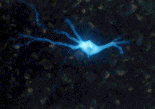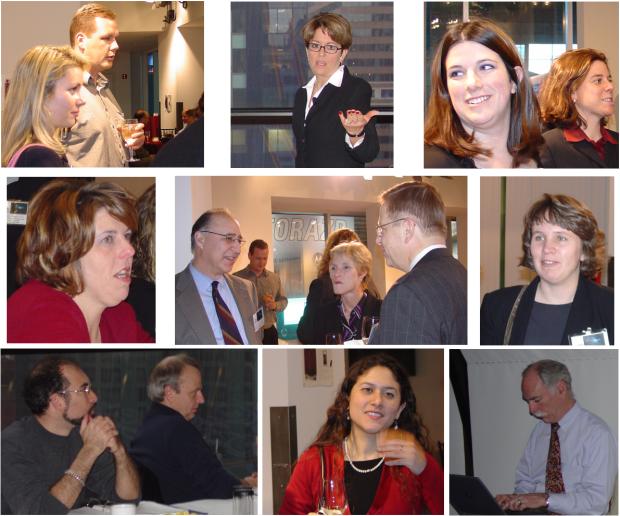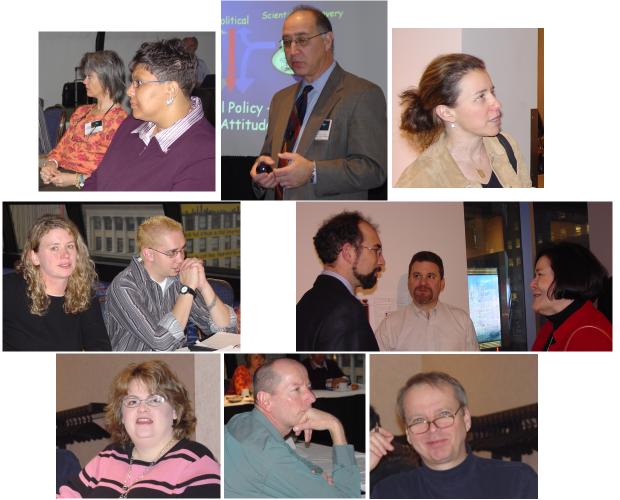Bill Bishop
Reporter
The Register-Guard
Eugene, Oregon
Cindy
Carcamo
Police Reporter
The Orange County Register
Santa Ana, California
Oren
Dorell
Reporter
The News & Observer
Post Office Box 191 215 McDowell Street
Raleigh, North Carolina
Gwen
Filosa
Staff Writer
The Times-Picayune
New Orleans, Louisiana
Frank
Green
Staff Writer
Richmond Times-Dispatch
Richmond, Virginia
Claudia
Kalb
Newsweek
New York, New York
Michael
Mello
Reporter
The Modesto Bee
Modesto, California
Mark
Morris
Federal Courts Reporter
The Kansas City Star
Kansas City, Missouri
|
|
Jane Prendergast
Reporter
The Cincinnati Enquirer
Cincinnati, Ohio
Heidi
Price
Staff Writer
The Observer-Reporter
Washington, Pennsylvania
Heather
Ratcliffe
Crime/Public Safety Reporter
St. Louis Post-Dispatch
St. Louis, Missouri
Wendy
Reeves
Staff Writer (Public Safety)
The Huntsville Times
Huntsville, Alabama
Laura
Ungar
The Courier-Journal
Louisville, Kentucky
Bob
Weigand
WZKZ Radio
New York, NY
Steve
Wildsmith
Addiction/Recovery Columnist, Weekend Editor
The Daily Times
Maryville, TN
Christopher
Windham
Reporter
The Wall Street Journal
New York, New York
|
On the introduction to pharmacological terms:
"A really good start for everything that followed."
"I thought he did an excellent job of making the terms understandable."
On
the history of addiction in America:
"Very
interesting presentation, and well-researched."
"Really enjoyed this portion. I would've liked for it to have gone
longer."
On
animal models of addiciton:
"Very
good/solid info."
On
the neurobiology of addiction:
"Greatly interested me. Probably the best part of the first day. Most
useful information."
"This and the following were my favorites."
On
the pharmacology of addiction:
"This was really the most fascinating explanation of what I see all
the time in court/crime reporting."
"The speaker made this complex stuff easy to grasp."
"Great lesson! Would like more detail about how each drug works
beyond the typical 3 abused substances."
On
the genetics of substance abuse:
"Very interesting, well presented, not too complex."
On
the personal side of addiction:
"While all these presentations are informative, this is the one that
ties them all together and puts a human face on the addiction problem."
"I could've listened longer. She's great for this audience since
she has the journalism background."
On
principles of addiction treatment/medications:
"Another good presentation bringing the disease/moral issue home."
"Very good. Interesting to learn about medical institutions' struggles
when it comes to addiction."
"Very interesting and practical."
On
evaluating treatment:
"One of my favorite. Very engaging & interesting.
Useful information kept my attention the entire time. For me, the data
was surprising. This presentation broke my pre-notions of drug addiction."
"Loved this data. Such a clear statement on what really is going
on in 'treatment' and society's non-commitment to real treatment &
understanding the issue."
On
treating the offender population:
"This guy really puts a lot of information on the table really
fast. Very informative -- one of the best presentations for those unfamiliar
with how courts work/don't work in treatment."
"Very much directly applicable to my job. I took the most story
ideas from this topic."
|
|
On
principles of prevention:
"Very
good and informative."
"A bit technical but essential in understanding the discussions
on evaluating treatment and [treating the] offender population."
On
scientifically reliable sources of information on the internet:
"This is one of the most important things you can give reporters."
"Very comprehensive. I had no idea there were so many sources."
"Very helpful -- real tools that we will use."
Overall
impressions:
"This
far exceeded my expectations. My notebook is full."
"Very well planned & stocked with information. I was surprised
at how good the speakers were. Insightful approach to advocating recovery
& treatment without political agendas or bias."
"I came for the science and really, really got what I wanted. The
criminal justice system connections were also top-notch."
"It was very well put together. It's obvious somebody spent a lot
of time getting the best researchers in the field together for this
workshop."
How
participants think the workshop will help them with their reporting
on substance abuse:
"Great sources -- not just speakers, but entire areas of study.
Nice reality check for reporters -- that addicts are not all criminal
or hopeless."
"I have
a better understanding of the biology behind addiction and scientific
findings on the issue."
"I'll always remember the brain chemistry connection. It really
drove away the little demons that make you want to be judgmental."
"I believe I will be able to write more in-depth stories with an
emphasis on addiction being a 'public health issue with public safety
consequences.'"
"I will certainly be more accurate with terminology and I have
a stack of the best resources and contacts."
What
participants liked most about the workshop:
"I liked all of it. But my favorites were the history presentation along
with neurobiology of addiction, personal story and evaluating treatment."
"A lot of effort went into making very complicated material as
simple as possible."
"Everything -- this has been one of the best planned conferences
I've attended."
"The speakers' resumes and their willingness to be sources for
us later."
|
David Friedman, Ph.D.
Director, Addiction Studies Program for Journalists
Professor
Department of Physiology and Pharmacology
Wake Forest University School of Medicine
Winston-Salem, North Carolina Sue
Rusche
Co-Director
Addiction Studies Program for Journalists
Chairman, President, and CEO
National Families in Action
Atlanta, Georgia
Brian
R. Flay, D.Phil.
UIC Distinguished Professor
Institute for Health Research and Policy
University of Illinois at Chicago
Chicago, Illinois
Jennifer
Logan, Ph.D.
Co-Director, Genetic Science Learning Center
University of Utah
Salt Lake City, Utah
Douglas
B. Marlowe, J.D., Ph.D.
Director, Section on Criminal Justice Research
Treatment Research Institute
University of Pennsylvania
Philadelphia, Pennsylvania
A.
Tom McLellan, Ph.D.
Director, Treatment Institute
University of Pennsylvania
Philadelphia, Pennsylvania
|
|
Karen
A. Miotto, MD
Associate Clinical Professor - Associate Director
Department of Psychiatry and Biobehavioral Sciences
Neuropsychiatric Institute
University of California - Los Angeles
Susan
Rook
Recovery Advocate
Alexandria, Virginia
Rochelle
“Shelly” Schwartz-Bloom, Ph.D.
Professor of Pharmacology
Duke University Medical Center
Department of Pharmacology & Cancer Biology
Durham, North Carolina
Jack
W. Strandhoy, Ph.D.
Professor
Wake Forest University School of Medicine
Department of Physiology and Pharmacology
Winston-Salem, North Carolina
Monica
L. Pace
Coordinator
Addiction
Studies Program for Journalists
Wake Forest University School of Medicine
Department of physiology and Pharmacology
Winston-Salem, North Carolina
|
Monday, January 10
8:30
Welcome and Introductions
David Friedman and Sue Rusche
8:45
Introduction to Pharmacological Terms
Jack Strandhoy
9:15
A History of Drug Abuse and Addiction in the U.S.
Sue Rusche
10:00
Animal Models of Addiction
Jack Strandhoy
10:15
Break
10:30
The Neurobiology of Addiction
David Friedman
12:00
Lunch
1:00
The Pharmacology of Addiction
Shelly Schwartz-Bloom
2:30
Break
2:45
The Genetics of Substance Abuse
Jennifer Logan
4:15
Scientifically Reliable Sources of Information
Sue Rusche
4:45
Evaluations
5:00
Adjourn
6:00
Reception at DEA Museum
7:30
Dinner at Marriott
|
|
Tuesday, January 11
8:45
A Personal Story of Addiction
Susan Rook
9:45
Break
10:00
Principles of Addiction Treatment, including Medications
Karen Miotto
11:30
Lunch
12:30
Evaluating Treatment
Tom McClellan
2:00
Break
2:15
Principles of Prevention
Brian Flay
3:30
Treating the Offender Population
Doug Marlowe
4:45
Evaluations
5:00
Adjourn |



